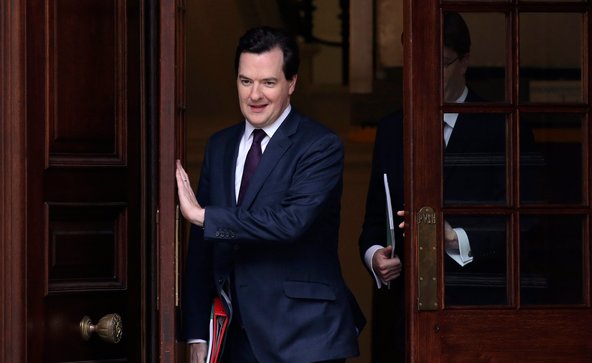 Pool photo by Chris RatcliffeGeorge Osborne, Britain’s chancellor of the Exchequer.
Pool photo by Chris RatcliffeGeorge Osborne, Britain’s chancellor of the Exchequer.
LONDON — Regulators in Britain should have the power to completely split up banks, a government-commissioned report concluded Friday, adding that changes being currently proposed do not go far enough to prevent a future crisis.
Plans to tighten banking regulation, which are expected to go before Parliament early next year, “fall well short of what is required,” the report said.
After the rate-rigging scandal that erupted this summer, Britain’s chancellor of the Exchequer, George Osborne, asked a parliamentary commission to take a closer look at the planned banking regulation overhaul. While Mr. Osborne had previously backed the plan, the commission found the proposals lacking.
Related Links
“Banks need to be discouraged from gaming the rules,” the report said. “All history tells us they will do this unless incentivized not to.”
Now, Mr. Osborne has to decide whether to follow the recommendations of the Independent Commission on Banking and further strengthen the rules or bow to pressure from the banking sector, which argued that any strict rules would harm its competitiveness. Under the current proposals, banks would have to protect, or ring-fence, their retail banking operations from possible losses at their investment banking units.
But the commission said on Friday that the rate-manipulation investigation, which has ensnared more than a dozen big banks around the globe, highlighted the need for even stricter rules. “The latest revelations of collusion, corruption and market-rigging,” the commission wrote in the report, are “the clearest illustration yet that a great deal more needs to be done to restore standards in banking.”
The commission recommended “electrification” of such a ring-fence, meaning there needed to be periodic reviews that the partition remained in place and realistic threats to keep banks from trying to bend the rules.
“Over time, the ring-fence will be tested and challenged by the banks,” the commission said in the report. “Politicians too, could succumb to lobbying from banks and others, adding to pressure to put holes in the ring-fence.”
Authorities in the United States and Europe are putting the finishing touches on a new set of banking regulations intended to avoid a repeat of the financial crisis that started in 2007.
In the United States, the Volcker Rule, a part of the Dodd-Frank act that would prohibit banks from making risky bets with their money, is nearing approval by regulators. In France, the finance minister, Pierre Moscovici, introduced a banking bill similar to one planned by Mr. Osborne.
But in some cases, the details remain murky. While latest recommendations by the British lawmakers might not fundamentally change the requirements for banks, they do add to the regulatory uncertainty for banks, which the industry contends makes it difficult to shape strategy.
“It’s suffocating,” Ian Gordon, an analyst at Investec, said. “There is constant speculation and change, and the number of resources banks have to make available is becoming more than a distraction.”
Anthony Browne, the chief executive of the British Bankers’ Association, an industry lobby group, warned that such uncertainty could threaten London’s position as a global financial center. “While it is clearly important to retain a degree of flexibility around the scope of the ring-fence, it is equally critical that any new system creates regulatory certainty for banks and their investors,” he said.
Article source: http://dealbook.nytimes.com/2012/12/21/after-rate-rigging-scandal-british-lawmakers-call-for-tougher-bank-rules/?partner=rss&emc=rss
Speak Your Mind
You must be logged in to post a comment.